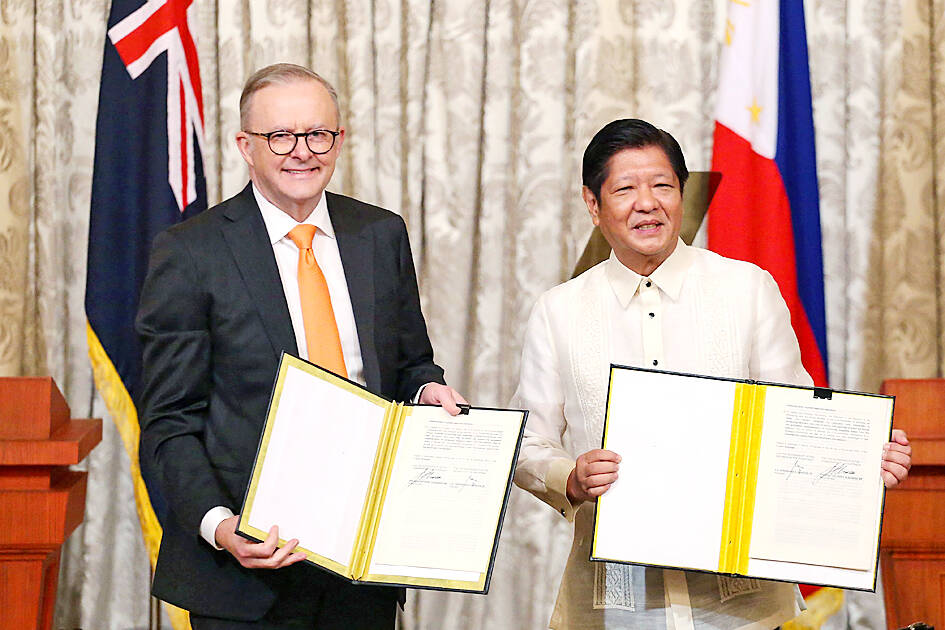The Philippines and Australia yesterday shored up their security and economic alliance with the signing of a strategic partnership, as they seek to counter China’s growing regional influence.
The agreement was finalized following a meeting between Philippine President Ferdinand Marcos Jr and Australian Prime Minister Anthony Albanese in Manila.
Albanese’s visit, which marks the first bilateral talks with an Australian prime minister in Manila in 20 years, follows a series of trips by senior members of his government to the archipelago nation since Marcos took office last year.

Photo: AFP
Under a strategic partnership, the nations are seeking to expand cooperation in several areas from defense and security to climate change and education.
“This elevation is an important symbol of the strength of our relationship and our shared commitment to do more together,” Albanese told officials, diplomats and reporters after the two leaders signed the agreement.
China’s growing assertiveness on Taiwan and the militarization of artificial islands in the disputed South China Sea have spurred Canberra, as well as Washington, to deepen defense cooperation with longstanding ally Manila.
At the start of talks, Marcos thanked Albanese for his “strong support” for the Philippines as it seeks to fend off maritime claims that are “not valid,” in a thinly veiled reference to China.
“To have friends like you and partners like you especially on that subject is very gratifying and encourages us to continue down that path,” Marcos told Albanese.
Albanese described the two nations as “great friends” and expressed the hope that his visit would help take the relationship “to an even higher level.”
A strategic partnership is the highest level of bilateral ties that Australia has had with the Philippines.
Former Philippine president Rodrigo Duterte pivoted away from his nation’s traditional security partners toward China, but the Marcos administration has sought to reverse that stance.
Australian and Filipino troops last month held a major joint exercise near the contested waters.
The event was watched by Marcos, Philippine Secretary of National Defense Gilberto Teodoro and Australian Minister for Defence Richard Marles.
Among other agreements signed during yesterday’s talks was a memorandum of understanding for reciprocal work and holiday visas. The nations also agreed to hold an annual defense ministers’ meeting.

FREEDOM OF NAVIGATION: The UK would continue to reinforce ties with Taiwan ‘in a wide range of areas’ as a part of a ‘strong unofficial relationship,’ a paper said The UK plans to conduct more freedom of navigation operations in the Taiwan Strait and the South China Sea, British Secretary of State for Foreign, Commonwealth and Development Affairs David Lammy told the British House of Commons on Tuesday. British Member of Parliament Desmond Swayne said that the Royal Navy’s HMS Spey had passed through the Taiwan Strait “in pursuit of vital international freedom of navigation in the South China Sea.” Swayne asked Lammy whether he agreed that it was “proper and lawful” to do so, and if the UK would continue to carry out similar operations. Lammy replied “yes” to both questions. The

‘OF COURSE A COUNTRY’: The president outlined that Taiwan has all the necessary features of a nation, including citizens, land, government and sovereignty President William Lai (賴清德) discussed the meaning of “nation” during a speech in New Taipei City last night, emphasizing that Taiwan is a country as he condemned China’s misinterpretation of UN Resolution 2758. The speech was the first in a series of 10 that Lai is scheduled to give across Taiwan. It is the responsibility of Taiwanese citizens to stand united to defend their national sovereignty, democracy, liberty, way of life and the future of the next generation, Lai said. This is the most important legacy the people of this era could pass on to future generations, he said. Lai went on to discuss

AMENDMENT: Climate change is expected to increase the frequency of high-temperature days, affecting economic productivity and public health, experts said The Central Weather Administration (CWA) is considering amending the Meteorological Act (氣象法) to classify “high temperatures” as “hazardous weather,” providing a legal basis for work or school closures due to extreme heat. CWA Administrator Lu Kuo-chen (呂國臣) yesterday said the agency plans to submit the proposed amendments to the Executive Yuan for review in the fourth quarter this year. The CWA has been monitoring high-temperature trends for an extended period, and the agency contributes scientific data to the recently established High Temperature Response Alliance led by the Ministry of Environment, Lu said. The data include temperature, humidity, radiation intensity and ambient wind,

SECOND SPEECH: All political parties should work together to defend democracy, protect Taiwan and resist the CCP, despite their differences, the president said President William Lai (賴清德) yesterday discussed how pro-Taiwan and pro-Republic of China (ROC) groups can agree to maintain solidarity on the issue of protecting Taiwan and resisting the Chinese Communist Party (CCP). The talk, delivered last night at Taoyuan’s Hakka Youth Association, was the second in a series of 10 that Lai is scheduled to give across Taiwan. Citing Taiwanese democracy pioneer Chiang Wei-shui’s (蔣渭水) slogan that solidarity brings strength, Lai said it was a call for political parties to find consensus amid disagreements on behalf of bettering the nation. All political parties should work together to defend democracy, protect Taiwan and resist